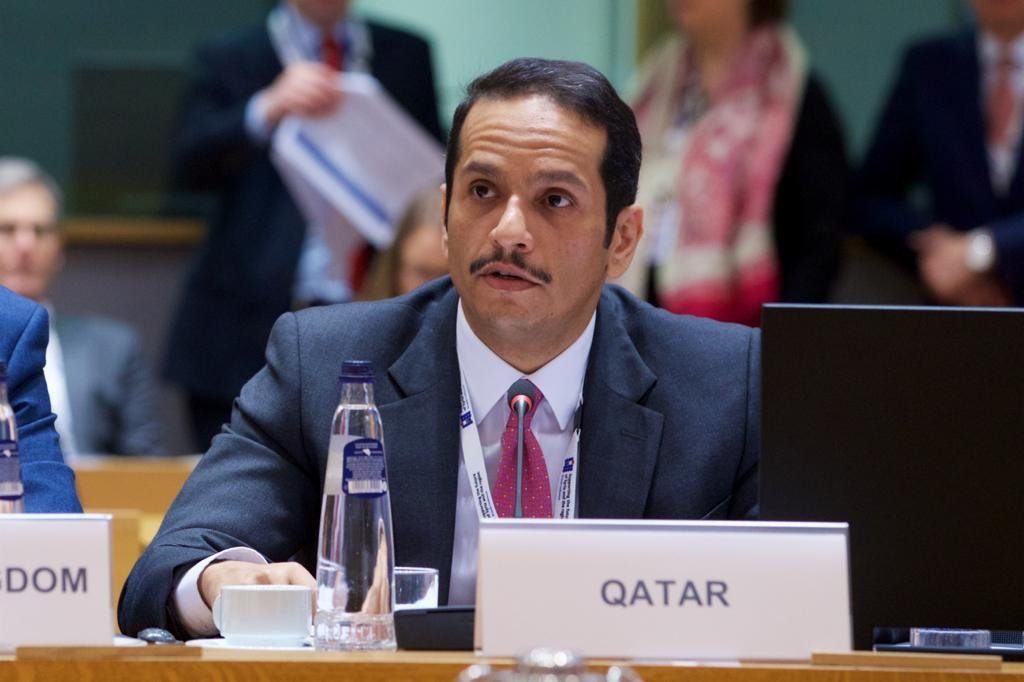The ministers of Arab and Islamic countries are meeting in China on Monday also as part of a tour aimed at ending the war in Gaza.
Qatar’s Prime Minister and Minister of Foreign Affairs Sheikh Mohammed bin Abdulrahman Al-Thani is travelling to the United Kingdom and Russia on Tuesday as part of the Islamic-Arab summit committee’s efforts to secure a ceasefire in Gaza.
The Gulf state’s foreign ministry spokesperson Majed Al Ansari announced the tour on Sunday in remarks to Qatar News Agency (QNA), confirming it was part of agreements made at the November 11 Arab-Islamic summit.
Al Ansari said that the tour was “an implementation of the mandate decision issued by the extraordinary joint Islamic-Arab summit in Riyadh on 11 November to formulate international action to stop the war raging in Gaza”, the QNA report said.
The meeting in Riyadh saw the attendance of members of the Arab League and the Organization of Islamic Cooperation (OIC). Qatar’s Amir Sheikh Tamim bin Hamad Al Thani was among a list of leaders in attendance.
The summit was held weeks following the start of the war on Gaza, in which Israeli occupation forces (IOF) have now killed more than 12,000 Palestinians, including 4,710 children, though the actual figure is believed to be higher.
Commenting on the upcoming tour, Al Ansari noted that the visits are carried out by foreign ministers of the Arab League and the OIC to “a number of permanent members of the United Nations Security Council.”
Some of the other foreign ministers involved in the initiative include officials from Jordan, Saudi Arabia, Egypt, Palestine, Turkiye, Indonesia, Nigeria among others.
“This initiative[…]aims to reach an immediate ceasefire in the Gaza Strip, exert pressure to launch a serious and genuine political process to achieve a lasting and comprehensive peace in accordance with established international references,” QNA added.
The diplomats are also seeking to push for “deterrent measures to stop the crimes of the colonial occupation authorities against humanity, while ensuring urgent relief corridors to avoid a humanitarian catastrophe.”
On Saturday, Saudi Foreign Minister Prince Faisal bin Farhan confirmed to the media that the ministers of Arab and Islamic countries are meeting in China on Monday also as part of a tour aimed at ending the war in Gaza,
“The first stop will be in China, then we will move to other capitals to convey a clear message that a ceasefire must be announced immediately, and let in aid,” the minister said, without disclosing the other countries involved in the tour.
That comes as China further expands its engagement with the Middle East, especially after brokering a historic deal between Saudi Arabia and Iran in March.
The Chinese-brokered deal resulted in the resumption of ties between the two countries for the first time since 2016, leading to more engagement between Riyadh and Tehran on a range of critical files, chief of which is the war in Yemen.
The Arab-Islamic committee’s trip to China also comes days after a meeting between US President Joe Biden and Chinese President Xi Jinping in San Francisco.
The four hours-long meeting dealt with the resumption of Washington and Beijing’s military contacts due to former-House of Representatives Speaker Nancy Pelosi’s visit to Taiwan last year—which China claims as its own.
“Today, I’m announcing that the US and PRC [People’s Republic of China] are resuming military-to-military communications. Clear and open communication between our defence establishments is vital to avoid miscalculation by either side and prevent conflict,” Biden said in a post on X, formerly known as Twitter, on Thursday.
Tensions between the US and China soared last year amid the Russian war in Ukraine, in which Washington accused Beijing of backing Moscow’s military operations.
Both countries are also at odds when it comes to the latest Israeli aggression on Gaza. While Washington has been calling for a “humanitarian pause”, Beijing had demanded an all-out ceasefire.
This also reflects the difference in stances between the Arab-Islamic committee and the US, as the former is also seeking a complete ceasefire in Gaza.
Some of the bold points made by the committee during last month’s summit included calls on “all countries to stop exporting weapons and ammunition” to Israel.
“[We] call on all countries to stop exporting weapons and ammunition to the occupation authorities that are used by their army and terrorist settlers to kill the Palestinian people and destroy their homes, hospitals, schools, mosques, churches and all their capabilities,” the statement read, as quoted by the Saudi press agency (SPA) at the time.
The statement also rejected “describing this retaliatory war as self-defence or justifying it under any pretext.”
While the statement fell short of naming countries, it came as Israel’s key Western allies, chief of which the US, continue to provide the IOF with military support through funding or the supply of weaponry.
In the first week of the war, the US House passed a Republican bill to provide Israel with $14 billion in aid to bolster Israel’s military capabilities under its “right to self-defence”.
It includes $4 billion to boost Israel’s Iron Dome, David’s Sling missile defence systems as well as military equipment transferred from US stocks, Al Jazeera reported at the time.
The occupying state is already getting $3.8 billion per year in military assistance and has received aid from the US worth more than $124 billion since its establishment following the Second World War.







